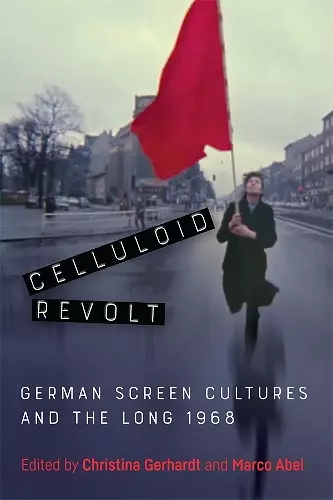Celluloid Revolt
German Screen Cultures and the Long 1968
Christina Gerhardt editor Marco Abel editor
Format:Hardback
Publisher:Boydell & Brewer Ltd
Published:22nd Apr '19
Currently unavailable, and unfortunately no date known when it will be back

Provides new insights into German-language cinema around 1968 and its relationship to the period's epoch-making cultural and political happenings. The epoch-making revolutionary period universally known in Germany as '68 can be argued to have predated that year and to have extended well into the 1970s. It continues to affect German and Austrian society and culture to this day. Yet while scholars have written extensively about 1968 and the cinema of other countries, relatively little sustained scholarly attention has thus far been paid to 1968 and West German, East German, and Austrian cinemas. Now, five decades later, Celluloid Revolt sets out to redress that situation, generating new insights into what constituted German-language cinema around 1968 and beyond. Contributors engage a range of cinemas, spanning experimental and avant-garde cinema, installations and exhibits; short films, animated films, and crime films; collectively produced cinemas, feminist films, and Arbeiterfilme (workers' films); as well as their relationship to cinemas of other countries, such as French cinéma vérité and US direct cinema. Contributors: Marco Abel, Tilman Baumgärtel, Madeleine Bernstorff, Timothy Scott Brown, Michael Dobstadt, Sean Eedy, Thomas Elsaesser, IanFleishman, Christina Gerhardt, Lisa Haegele, Randall Halle, Priscilla Layne, Ervin Malakaj, Kalani Michell, Evelyn Preuss, Patricia Anne Simpson, Fabian Tietke, Andrew Stefan Weiner. Christina Gerhardt is Associate Professor of German and Film Studies at the University of Hawai'i at Manoa. Marco Abel is Professor of English and Film Studies at the University of Nebraska-Lincoln.
[A]bly edited by [Christina] Gerhardt and Marco Abel, [this volume] auspiciously brings together the work of scholars based in Europe and North America (still a rarity in German film studies). . . . A particular strength of the collection is its detailed attention to film feminisms. -- Hester Baer * GERMAN QUARTERLY *
Thrilling in intellectual rigor and scope, the book's accomplishment is an inestimable one for future studies of committed film and media, particularly those interested in Tricontinental theory, post-socialist Europe, and the worldwide South. -- Nace Zavrl * NECSUS *
[P]rovides fresh perspectives on the participation of German-language film in . . . social, cultural and political campaigns [around 1968]. . . . [H]ighlights how the vitality and abundance of cultural production at the time goes well beyond, stands aside from, and/or critiques leftist politics. Given these features, the volume becomes an invaluable source for the study of German and Austrian screen cultures aligned to the events of 1968, while also stimulating new directions and approaches around this subject. -- Claudia Sandberg * STUDIES IN EUROPEAN CINEMA *
[This book] deepens the reader's understanding of how German-language cinema engaged with the events of the long 1968. Most importantly, it subverts the usual narrative that associates the politics of this era exclusively with West Germany. . . . [S]uccessfully redefine[s] cinema's relationship with 1968 across the axes of politics and aesthetics. -- Catriona Corke * GERMAN STUDIES REVIEW *
The essays and interviews in this collection focus exclusively on German-language films -- West German, East German, and Austrian films -- looking at how the revolutionary happenings in Europe in 1968 were captured in the cinematic imaginations of young and sympathetic moviemakers. * CHOICE *
Scholarship surrounding this era will benefit immensely from these well-curated articles and interviews and the huge range of filmic texts that they explore. -- Rob McFarland * FEMINIST GERMAN STUDIES *
[B]roaden[s] its coverage to "greater Germany" (the GDR and Austria) as well as the FRG. The four essays on the GDR (by Ian Fleishman, Sean Eedy, Patricia Anne Simpson, and Evelyn Preuss) combine to dispel the common perception that East German cinema was a wasteland untouched by what was happening in the world outside and that it was so tightly controlled that directors were in effect hamstrung. . . . [This volume and two others by the editor Christina Gerhardt, also reviewed] are an admirable achievement. -- Denise J. Youngblood * HISTORICAL JOURNAL OF FILM, RADIO, AND TELEVISION *
ISBN: 9781571139955
Dimensions: unknown
Weight: 626g
338 pages